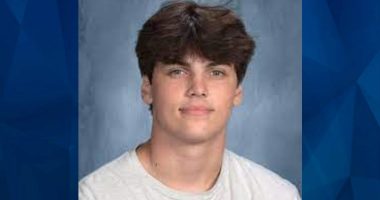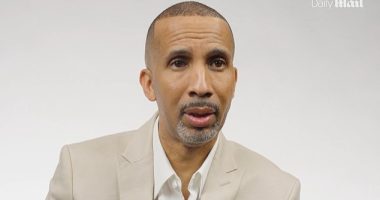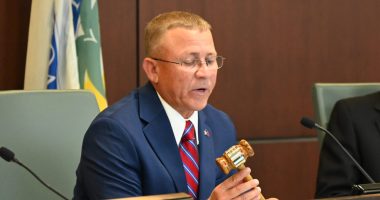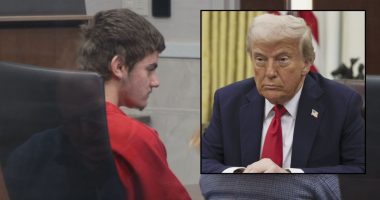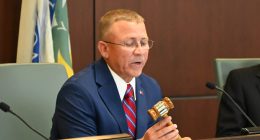
Special counsel Jack Smith speaks about an indictment of former President Donald Trump, Aug. 1, 2023, at a Department of Justice office in Washington. (AP Photo/Jacquelyn Martin, File)/ Inset: Donald Trump speaks to the press before the start of a civil fraud trial brought by NYS Attorney General Letitia James at NYS court in New York on October 2, 2023. Photo by Lev Radin/Sipa USA)(Sipa via AP Images)
In a pair of filings, special counsel Jack Smith’s prosecutors argued that a recent attempt by Donald Trump to extend deadlines set in his election subversion case in Washington, D.C., is a ploy “by design” to “disrupt” his impending March trial date.
The filings are in response to motions made last week by the former president’s defense attorneys John Lauro, Greg Singer and Todd Blanche. One motion asks presiding U.S. District Judge Tanya Chutkan to extend the existing Oct. 9 deadline for the defense to file pretrial motions by 60 days, to a point in December, while a second motion requested more time to review classified documents produced by the government in advance of trial.
Trump’s legal team has argued the pretrial motions extension is imperative because the defense lawyers need more time to explore what they say are issues of “executive immunity, failure to state a claim and improper conduct by the Special Counsel during the grand jury process” and “flawed legal theory.”
Despite the existing Oct. 9 briefing deadline, however, the defense has yet to file any motions addressing these issues specifically. This, prosecutors emphasized on Monday, was particularly striking since both Trump and members of his legal team have signaled an intent to file immunity or First Amendment claims “weeks before” the first status hearing was even set in Washington, D.C.
The former president’s team often makes assertions around the “enormity of unique legal issues” in the case precipitating delays, yet “not ones based on factual issues,” Assistant U.S. Attorney Thomas Windom wrote in the opposition to the deadline extension motion.
Windom also criticized Trump’s motion for access to classified documents and to vacate a previously-set deadline for lawyers to meet the requirements of the federal Classified Information Procedures Act (CIPA). The prosecutor notes that since the start of the case, the government has said that classified materials would not be used in prosecutors’ case in chief, nor does the government intend to introduce much or any of the records at trial itself — the records were only part of what was being produced in the normal order of pretrial proceedings, they said.
“The defendant’s motion seeks to forestall any progress on the Court’s resolution of the narrow and incidental classified discovery issues in this case and upend the carefully considered pretrial schedule,” Windom’s filing says. The prosecutor also describes the “classified discovery issues” as “limited and tangential” to the case.
During an Aug. 28 hearing, prosecutors told Chutkan that Trump’s legal team would have access to “five to ten nonduplicative classified documents totaling less than a hundred pages of material as well as a roughly 125-page classified transcript, the only relevant five-page excerpt of which the Government already had provided the defense in unclassified form.”
Gaston ends and Chutkan moves next to “the small amount of classified materials in this case.” She wants to discuss it now, Lauro agrees.
CIPA doesn’t guarantee additional rights to discovery disclosure. Just relates to procedure during discovery and lead up to trial.— Brandi Buchman (@Brandi_Buchman) August 28, 2023
Chut: There are 3 steps governing handling of classified info. 1) Defense must file pretrial notice IDing classified info to use at trial, 2) upon govt motion, court shall hold hearing to determine use/relevance/admiss. and 3) after that, govt cant move to sub in redacted info
— Brandi Buchman (@Brandi_Buchman) August 28, 2023
At that time, Blanche, the Trump attorney, already had an interim security clearance and he informed the government he was weeks away from achieving the final clearance necessary for the case. He finalized it within the first week of September. Prosecutors had already asked Chutkan to give Blanche 30 days after achieving his final clearance to then review the classified materials in question.
But Trump’s team instead suggested they all wait until Blanche’s fellow counsel Lauro obtained his own clearance.
As Politico reported late last month, Trump has retained a swath of attorneys to defend him across his indictments in Florida, Georgia, New York and Washington. But noticeably absent from the official roster of attorneys admitted to appear in the case in Washington — even as Trump claims that he needs more time to review classified materials — are his newly-hired attorneys Kendra Wharton, an expert in white collar crime, and Emil Bove, a former federal prosecutor from New York, both of whom have full clearances. As of Tuesday, however, neither had appeared on the record to represent Trump before Chutkan.
Read Related Also: Ex-Boyfriend Charged with Killing, Dismembering, Burning Mom of 2 for Reporting Rape
Bove, Blanche told CNN, is an expert in “white collar and CIPA-related litigation.”
When prosecutors filed their oppositions on Monday afternoon, Lauro had not yet notified the court that he had indeed achieved a security clearance, a fact the government noted in its reply. The same went for attorney Singer. But then, on Tuesday morning, an order signed by Chutkan instructed both Lauro and Singer to “initiate and complete all security clearance tasks” as directed by the DOJ, as well as file a notice of compliance, by Oct. 11.
Windom urged Chutkan on Monday to see through Trump’s thin attempts to waylay the proceedings.
“The defendant’s motion seeks to forestall any progress on the Court’s resolution of the narrow and incidental classified discovery issues in this case and upend the carefully considered pretrial schedule,” the prosecutor said in the opposition to Trump’s CIPA motion. “In service of his effort to delay the proceedings, the defendant asserts that no action can take place until an indeterminate future date of his choosing. Specifically, the defendant contends that the Constitution guarantees that the Court cannot resolve pretrial classified discovery issues until after any and all counsel on his team obtain security clearances and review the entirety of classified discovery.”
Special counsel revealed in the filing on Monday that Trump’s lawyers have already reviewed 975 pages of classified materials, and most of that is attributed to a 761-page document from the Department of Defense — “the majority of which is not classified,” Windom noted.
A classified portion of a witness interview with the FBI some 50 pages long has also been provided to Trump’s team. The government also submitted a 118-page classified transcript that was already described to Trump on Aug. 28.
The former president has also objected to the government’s request to follow typical ex parte procedures as required under CIPA. Ex parte would mean prosecutors would have opportunity to speak to Chutkan without the defense present — a necessary arrangement, since Trump’s lawyers lack the proper clearances. Trump’s lawyers say he is entitled to the same right but argued last week that he cannot do this until his lawyers have reviewed everything in discovery.

Former President Donald Trump’s attorney John Lauro accompanied by other lawyers leaves federal court, Monday, Aug. 28, 2023, in Washington. A judge has set a March 4, 2024, trial date for Donald Trump in the federal case in Washington charging the former president with trying to overturn the results of the 2020 election. (AP Photo/Jose Luis Magana)
But as prosecutors noted Monday, they have already given Trump’s team everything they need, including materials that don’t have to be produced until February 2024, like interview and grand jury transcripts and audio recordings for 350 witnesses.
All Trump must do is delineate what it is that he needs that he thinks will be “relevant and helpful,” instead of ask for delays, Windom argued, since “the defendant evidently knew his defense theories before ever reviewing a page of unclassified or classified discovery.”
“In the days and weeks following his indictment, the defendant and his counsel broadcast the principal defense theories in multiple public appearances in national media outlets,” Windom wrote. “For example, the day after the defendant’s arraignment, defense counsel was asked on National Public Radio ‘to talk a little about your legal strategy’ and ‘give us a summary of your legal defense to these criminal charges.’ Defense counsel then told the national audience, ‘Well, it’s not a big surprise,’ and the defendant ‘got advice from counsel – very, very wise and learned counsel – on a variety of constitutional and legal issues.’”
Lauro made similar statements to NBC, including that Trump was simply “petitioning” then-Vice President Mike Pence under his First Amendment right on Jan. 6 as he beseeched him to overturn the results of the 2020 election despite the fact that Pence had no authority to do so.
Windom called Trump’s CIPA motion “legally and factually flawed,” and asked Chutkan to deny it.
The next hearing where prosecutors and defense attorneys are slated to meet is set for Oct. 16 at 10 a.m.
Have a tip we should know? [email protected]

